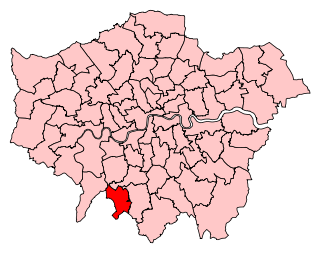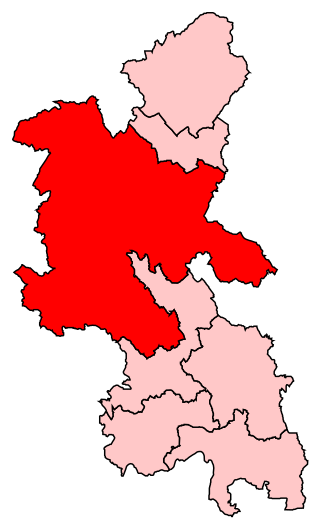Related Research Articles

A Reagan Democrat is a traditionally Democratic voter in the United States, referring to working class residents who supported Republican presidential candidates Ronald Reagan in the 1980 and the 1984 presidential elections, and George H. W. Bush during the 1988 presidential election. The term Reagan Democrat remains part of the lexicon in American political jargon because of Reagan's continued widespread popularity among a large segment of the electorate.

The phrase "Middle England" is a socio-political term which generally refers to middle class or lower-middle class people in England who hold traditional conservative or right-wing views.
A swing vote is a vote that is seen as potentially going to any of a number of candidates in an election, or, in a two-party system, may go to either of the two dominant political parties. Such votes are usually sought after in election campaigns, since they can play a big role in determining the outcome.
Essex man and Mondeo man are stereotypical figures which were popularised in 1990s Britain. The "Essex man" as a political figure is an example of a type of median voter and was used to help explain the electoral successes of Conservative Prime Minister Margaret Thatcher in the 1980s. The closely related "Mondeo man" was identified as the sort of voter the Labour Party needed to attract to win the election in 1997. Basildon man and woman are narrower terms being used synonymously.
An electoral swing analysis shows the extent of change in voter support, typically from one election to another, expressed as a positive or negative percentage. A multi-party swing is an indicator of a change in the electorate's preference between candidates or parties, often between major parties in a two-party system. A swing can be calculated for the electorate as a whole, for a given electoral district or for a particular demographic.
Worcester woman is a political term used by polling companies in the United Kingdom. It profiles or describes a type of median voter, a working class woman in her 30s with two children who worries about quality of life issues and has little interest in politics. Not necessarily hailing from the West Midlands city of Worcester, Worcester woman has been described as an important swing voter when it comes to deciding elections.

Worcester is a borough constituency represented in the House of Commons of the Parliament of the United Kingdom. Since 1885 it has elected one Member of Parliament (MP) by the first past the post system of election; from 1295 to 1885 it elected two MPs.

Southend West is a constituency in the House of Commons of the UK Parliament. The seat is currently held by Anna Firth who won the 2022 by-election, following the murder of the incumbent MP, David Amess.

Sutton and Cheam is a constituency in Greater London represented in the House of Commons of the UK Parliament since 2015 by Paul Scully, a Conservative.

Buckingham is a constituency represented in the House of Commons of the UK Parliament since 2019 by Greg Smith, a Conservative.

Thurrock is a constituency represented in the House of Commons of the UK Parliament since 2010 by Jackie Doyle-Price, a Conservative.

The 2010 United Kingdom general election was held on Thursday 6 May 2010, with 45,597,461 registered voters entitled to vote to elect members to the House of Commons. The election took place in 650 constituencies across the United Kingdom under the first-past-the-post system.

Milton Keynes South is a constituency represented in the House of Commons of the UK Parliament since its 2010 creation by Iain Stewart, a Conservative.
Holby City woman (HCW) was a voter demographic which was identified by Conservative Party strategists in the United Kingdom as a key group of voters for the Conservative Party at the 2010 general election. The term is taken from the fictional BBC hospital drama Holby City, set in South West England. The character of Faye Morton has been described as an example of a typical "Holby City woman".
The 2000 Milton Keynes Council election took place on 4 May 2000 to elect members of Milton Keynes Council in Buckinghamshire, England. One third of the council was up for election and the council stayed under no overall control.
The 2010 Milton Keynes Council election took place on 6 May 2010 to elect members of Milton Keynes Unitary Council in Buckinghamshire, England. One third of the council – the 17 seats contested in the 2006 election – was up for election and the council, which totalled 51 seats, remained under no overall control. An extra seat in Stony Stratford was also contested.
The 2019 United Kingdom general election of 12 December 2019 saw many new pieces of politics-related jargon enter popular use.
Workington man is a political term used by polling companies in the United Kingdom. Named after the Cumbria town of Workington, the term was first used ahead of the 2019 general election. Workington man describes the stereotypical swing voter who it was believed would determine the election result. Their support of the Conservatives in the 2019 election helped the party break the Labour Party's Red Wall of safe seats.
Jim Pickard is a British journalist and the current chief political correspondent at the Financial Times. Pickard joined the FT in 1999 and became chief political correspondent for the paper in 2013.
References
- 1 2 3 Pickard, Jim (21 January 2010). "Party pollsters chase after Motorway Man". Financial Times. Retrieved 8 February 2010.
- 1 2 3 Hall, Macer (23 January 2010). "'Motorway man' holds key to election". Daily Express. Retrieved 7 February 2010.
- 1 2 3 Doward, Jamie (7 February 2010). "Motorway Man holds key to general election victory". The Observer. Retrieved 7 February 2010.
- ↑ Pickard, Jim (22 January 2010). "British parties in election drive to track down Motorway Man". Financial Times. Retrieved 7 February 2010.